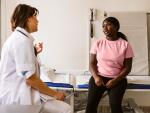
In celebration of National Doctors Day, we asked five physicians why they became a doctor. What inspired them to pursue medical school? And why did they choose their particular specialty? It might surprise you to learn that these doctors attended med school for a variety of reasons that range from pleasing their parents to boosting their own self-confidence. Read these doctors’ stories and discover what continues to motivate them as physicians today.
“I want to help babies thrive.”
I became a doctor because I have always been fascinated by science and medicine and enjoy helping others. I specialized in neonatal nutrition because nutrition is a vital component of care for these tiny premature infants and nutrition impacts the lives of all babies. I am inspired daily by the babies and their families. Premature infants are fighters and it is rewarding to see them grow and get better, which is a miracle. Watching these infants thrive is all the motivation I need to continue my work from day to day.
Amy Boriskie Hair, MD, neonatologist, program director of Neonatal Nutrition at Texas Children’s Hospital, Baylor College of Medicine, Houston
“I never wanted to feel helpless again.”
The drive to become a doctor was solidified for me at a family dinner. My aunt, who had been diagnosed with Lou Gehrig's disease, began to choke at the dinner table. My father came to her rescue and performed the Heimlich maneuver while I sat frozen in my chair. It was at that moment that I decided I did not ever want to be in a similar situation again. I never wanted to feel like I didn't know what to do or could not help someone. That summer I started college as a premed student.
Today I feel motivated by my patients, of course. There is no better feeling than taking away someone's pain, treating an infection, or performing a curative operation for cancer. It is a privilege to be a surgeon.
Stacie Kahan, MD, endocrine and general surgeon, White Plains Hospital, White Plains, N.Y.
"The field found me.”
Sports neurology and pain medicine found me. I can't say that I ever had a revelation to choose these fields of medicine. I didn't carefully consider and weigh the options or agonize over a decision to pursue this or that medical career. My practice found me.
What motivates me today? As a young man I was an avid athlete, so I’m inspired to I serve as a neurological medical consultant to local professional sports organizations in Los Angeles and assist local college and numerous high schools and youth sports/club athletic teams in this capacity. Living and breathing this field of medicine means striving to educate every athletic population I can about the need for serious attention to neurological injury risks in players at every level of the game.
Vernon Williams, MD, neurologist and founding director of the Kerlan-Jobe Center for Sports Neurology and Pain Medicine in Los Angeles
“My parents wanted me to.”
My parents always talked about me becoming a doctor. They never spoke about any other careers for me. Now that I’ve been practicing orthopedics for a while, what keeps me motivated is exploring sex- and gender-based differences in health conditions. We need to perform additional research to identify more of these differences and bring all of this information into the training of healthcare professionals. There is also much work to be done to level the playing field for women in medicine, especially those who would be suited for leadership positions but are not promoted due to continued issues with unconscious bias.
Kim Templeton, MD, orthopedic surgeon at the University of Kansas Hospital and President of the American Medical Women’s Association, Kansas City
“To provide old-fashioned doctoring and mentoring.”
As a young child, I shied away from blood. But when my brother was injured in a car accident, I enjoyed helping him through his recovery. When I discovered how much I liked helping people, I decided to enroll in an osteopathic college with the goal of becoming a well-rounded, old-fashioned type of doctor.
Today, I feel motivated to help young people become confident, qualified doctors themselves. As an assistant professor at my alma mater, I tell new students stories about my school days and how I dealt with issues over the course of my studies. Just before graduation, they tell me how much hearing those stories helped them understand the process and overcome their fears.
Nancy Bono, D.O., chair of the family medicine department at New York Institute of Technology College of Osteopathic Medicine, New York













